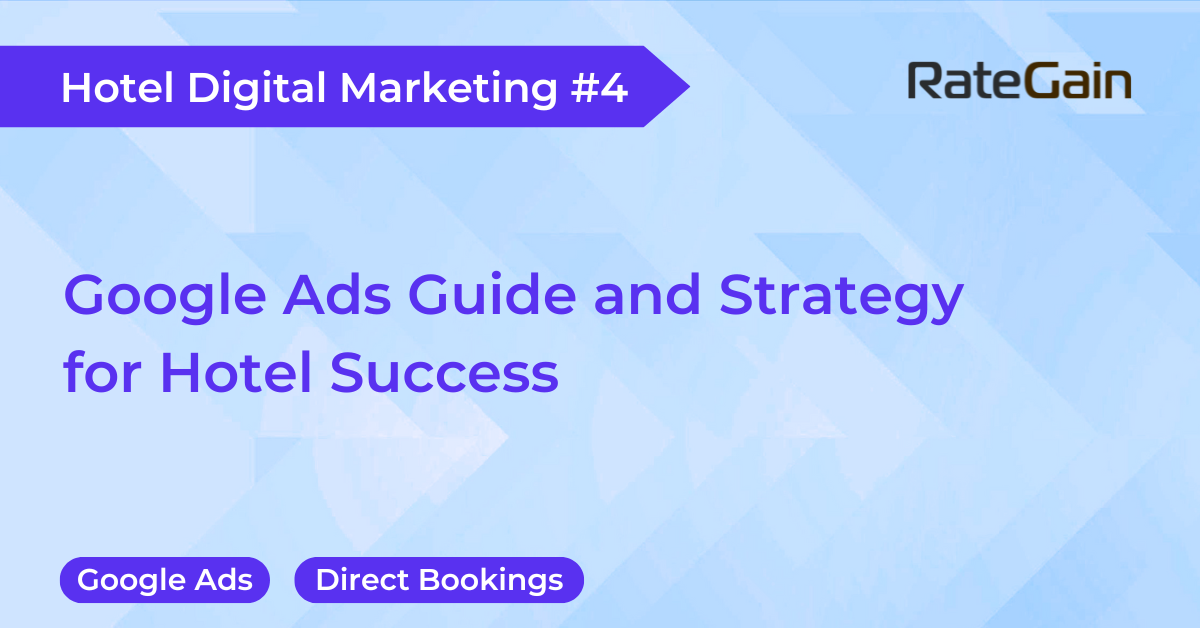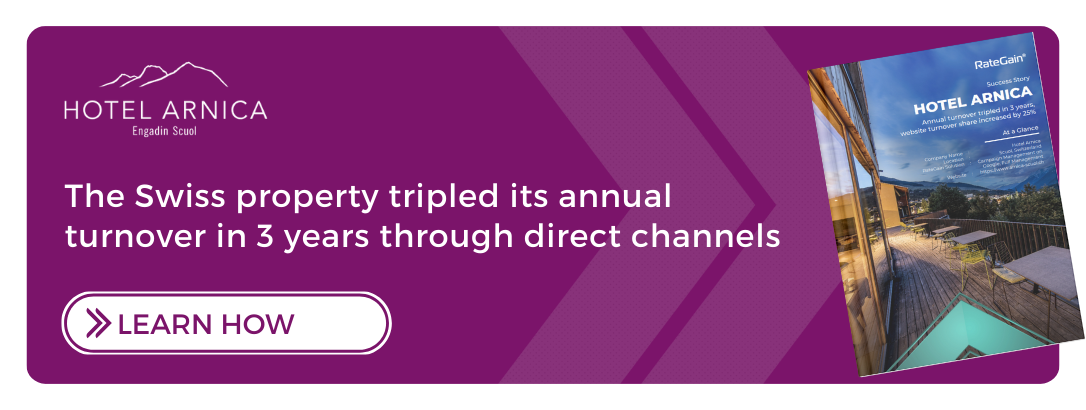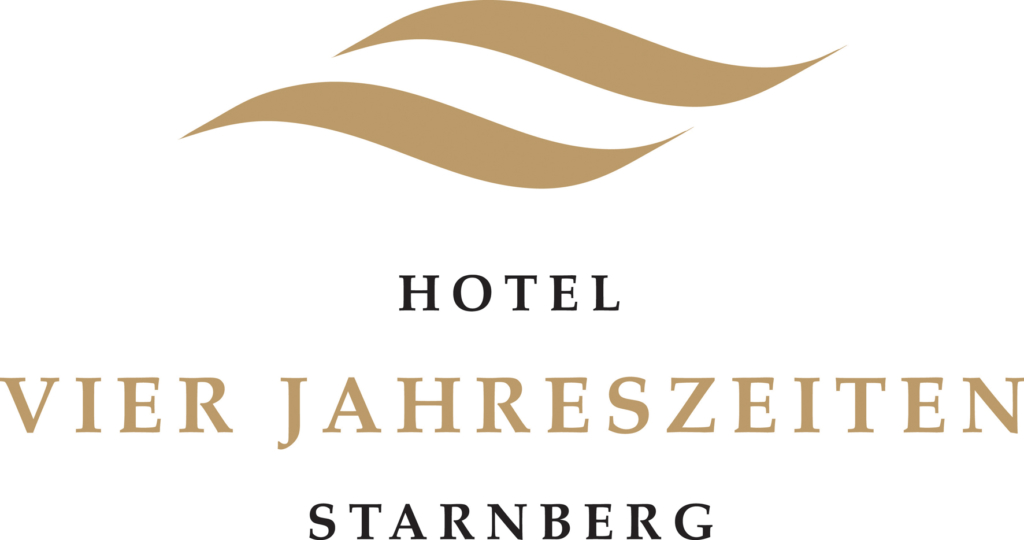Today’s digital consumer is always connected. According to a recent study, the average person spends 6 hours and 42 minutes online daily. It’s important to be visible online to achieve results, especially when potential buyers search for information on your products and services.
One consistent thread in the consumer journey example above is search prominence. As a business owner, you must ensure that your website is a useful resource for all relevant searches. If you have a website with the solution to a search query like ‘Hotels open near Miami,’ it may appear in the results. How? Because of Google’s advertising algorithm, which conducts an auction.
Advertisers bid for ad placements. Eligible advertising competes for a position on the search results page, ranking above and below organic results. The ‘winners’ are displayed on the page, plainly marked with an ‘Ads’ sticker. Google ads can prompt users to take action, such as visiting a website, making a phone call, or dialing a trackable number. Let’s go over this in-depth!
What Are Google Ads and How Do They Benefit Hotels?
Google Hotel Ads, simply put, is paid advertising within Google’s hotel product offering. In general internet searches for ordinary things, most consumers recognize the distinction between organic and paid results, frequently at the top and labeled as Ads.
These ads function similarly to any other channel to which you connect your hotel, with the extra benefit of running ads to be viewed. Visibility is essential because your hotel will be one of many competing for the attention of someone searching for ‘hotels in your location.’
Unless someone already knows the property and searches for your exact property name, they will be shown your company profile and, if enabled, a free booking link. Also, search results can be improved by creating a Google profile for your hotel and providing them with real-time information about your resort, such as inventory and rates.
Moreover, engaging in Google Hotel Ads provides several benefits to independent hotels, including possibilities to:
- Increase visibility: Your property will get more exposure in Google Search and Maps, which receive a lot of traffic from people considering a trip to your destination.
- Target active trip planners: Since Google Hotel Ads are only displayed if your property is open on the specified booking dates, you only pay for clicks when rooms are available.
- Upsell: When tourists book through your website’s landing page, you have more influence over the booking process. You can advertise higher-category accommodation types, packages, and amenities that may not be offered through OTAs. In pre-stay messaging, you can provide unique incentives to improve their room, prolong their stay, pre-order amenities, or reserve a seat at your restaurant.
- Compete with OTAs: When consumers click on your Google Hotel ad, they will be directed to your website, where they may book directly with you. This allows you to avoid OTAs and their booking costs of 15%-25%, considerably enhancing the profitability of each booking. In this way, Google Hotel Ads levels the playing field, allowing you to compete with Booking.com and Expedia, which have large marketing budgets.
Setting up a Google Ads Account for Hotels
Here is a step-by-step guide to setting up a Google Ads account optimized for hotels:
- Create a new Google Ads account or log into your existing one at ads.google.com. Make sure to use an account specifically for your hotel or group.
- Set up billing and payment information. Define a monthly budget for your hotel campaigns. Start lower while testing to manage costs.
- Create campaign structures based on goals, such as separate campaigns targeting brand searches and local/discounted room types. Use negative keywords between them.
- Carefully research and organize keyword lists into ad groups around topics and search themes. Include relevant locally searched terms. Leverage tools like Google Keyword Planner.
- Design appealing text, image, and video ads optimized for desktop and mobile. Emphasize what makes your hotel stand out.
- Develop dedicated landing pages that align with each ad group and campaign. Make them easy to navigate with clear calls to action.
- Extensively test out bids, placements, ad variations, keywords, and devices. Iterate based on performance data. Identify and optimize high-converting search queries.
- Implement tracking like Google Analytics goals and AdWords conversion tracking to accurately evaluate bookings from the different campaigns and segments.
Also, regularly assess results and fine-tune your Google Ads account to achieve advertising KPIs.
Importance of Keyword Research in Hotel Advertising
Keyword research is the process of determining the words and phrases that people use to search for specific products or services. Once you’ve identified the terms your target audience uses, you may optimize your website to appear in search results.
Consider it a thorough assessment of your website. Keyword research enables you to learn what people are searching for online while looking for hotels, much like hotel management may assess guest comments and hotel performance to improve services.
Furthermore, keyword research is vital for hotels since it allows them to:
- Identify their target audience’s tastes and needs, which can inform the amenities and services they offer, resulting in increased bookings and a better guest experience.
- Understand what customers seek when looking for housing and improve their website accordingly.
- Identify and understand the local competitors to develop a more effective SEO strategy.
Creating Compelling Ad Copies for Hotels
Hotel ads must pique interest and highlight your property’s strongest selling points. Your limited ad text real estate means every word must capture attention and convey value. Start by identifying your hotel’s unique amenities, experiences, or location details to differentiate it from competitors.
For example, recently renovated rooms, rooftop pool bar, or steps from top attractions. A few other tips that can help you out are:
- Craft an appealing, benefit-driven headline that speaks directly to various target audiences – business travelers, families, and couples seeking romance.
- Use persuasive, emotive phrases focused on feelings and desires matched to each audience versus just dry features. Spark travel anticipation. For example, the business headline—Rejuvenate in spacious hotel suites—or a romantic headline—Savor precious moments.
- In the body text, communicate key amenities like free breakfast, WiFi, parking, and airport shuttle. However, balance listing because too many hotel features can overwhelm your customers.
- Localize your ads with city location to increase relevance for searches. End copy with hotel name or strong brand trademark.
The most compelling hotel ads reflect the specialized guest experiences you offer versus your competition. Also, they engage precise traveler needs framed around benefits and feelings.
Designing Landing Pages for Hotel Campaigns
Creating optimized landing pages is crucial for converting ad clicks into hotel bookings. Here are some tips:
- Outline goals for each landing page – what customer segment and part of the booking funnel it addresses. You can create pages for campaigns like weekend getaways, suites, and loyalty members.
- Design for ease of use on all devices and present clear navigation and value proposition upfront. Use striking yet relevant visuals mirroring ad images that set page tone and expectations.
- Craft headlines, subheads, and copy to engage the precise traveler visiting each page. Also, provide details matching their intent – romance package, airport shuttle, conference rooms.
- Continuously test page variations – images, headlines, calls to action. Measure results through Google Analytics. Then, refine pages to optimize metrics like bounce rates, time on site, and bookings triggered.
- Optimized landing pages aligned tightly to ad objectives and audience needs to give hotels the best opportunity to convert valuable paid traffic into direct bookings.
Ad Targeting Strategies for Hotels
Hotel advertising is a marketing tactic hotels employ to promote their services and facilities. It is critical for enhancing awareness, recruiting potential customers, and setting the hotel apart in a competitive market. Effective marketing can substantially impact consumer behavior and revenue production for hotels. So, to assist you ace Google Ads, here are a few tactics you can use:
-
Call to Action
Your call to action(s) should be prominently displayed on a clickable button that stands out from the rest of the material. Now is not the time for subtlety or complicated wording regarding sales copy. Make the call-to-action copy clear, direct, and evident so that the user understands what to expect when they click on it. To increase the urgency, use an action verb such as ‘Book now,’ ‘Reserve a room,’ or ‘Check availability.’
-
Stay Simple
Remember that simplicity sells when enticing potential guests with a copy. In today’s fast-paced, choice-driven world, information overload is all too typical. Customers prefer simple products. Being direct isn’t as simple as it seems.
As a hotel marketer, you may want to ensure that browsers know all the features available. You’re better off keeping that content off your homepage. Instead, entice them with concise sales language highlighting only the most relevant points. Don’t let a flood of descriptions drown out your important point.
-
Prove Your Worth
After boasting about your most significant benefits, the reader is inclined to be skeptical. Why would they believe you? Now is the time to present evidence to back up your bold assertions. Show your strength with some impressive statistics, amazing reviews, or anything else that proves your hotel is what it claims to be. You may utilize client feedback to back up your claims or indicate to potential customers what they will lose out on if they don’t choose your hotel.
-
Highlight the Most Significant Advantages
Features tell; advantages sell. It’s an advertising cliché; like most clichés, it has more than a grain of truth. Make sure to highlight your most significant benefits. However, rather than listing them (a casino, nightclub, and several dining and drinking places, to mention a few) on your webpage, use a short, snappy phrase emphasizing the overall advantage of their amenities to customers, such as ‘Play where you stay.’
Measuring and Analyzing Campaign Performance
Just as a pilot chooses a destination for their flight, your hotel must determine the measurements it will use to evaluate success, which we call key performance indicators (KPIs). These are the KPIs that fit with your marketing objectives and serve as navigational markers.
Here are some examples of hospitality KPIs:
- Net Sales: How many sales did you make during the marketing period?
- Clicks: What is the number of individuals that clicked on a digital ad?
- Impressions: How many people noticed a touchpoint in your campaign?
- Conversions: How many people completed a desired action after viewing a campaign touchpoint?
- Cost per Acquisition: How much marketing money was spent to get one customer?
Also, once you’ve started your campaign, monitor how it affects your marketing performance. The best method to accomplish this is to relate your marketing to sales. This is true even if your campaign is aimed at attracting new customers.
Budget Management and Optimization
There is no set price for Google Hotel Ads. That figure is dynamic and depends on various things, including the type of advertisements you’re running, the localized competition, the keywords you’re targeting, and more.
You should monitor whatever you’re paying per click and find ways to reduce it. Optimizing your Google ad campaigns and ad spending entails various processes that improve your conversion and ROI.
The first step in Google ad spend management is completely comprehending the pay-per-click business. A basic understanding of this will assist you grasp the ins and outs of bidding.
The second stage, and possibly the most critical, is to establish your budget. Many hotel owners have questionable advertising expenditure habits. So, even when they aren’t generating the requisite ROI, they spend on ads in the hopes of converting. Setting a budget allows you to track results, calculate CPA over a fixed period, and take specific improvement steps.
In addition to these two broad steps, you can effectively manage your Google hotel ad spending by connecting Google Ads and Google Analytics, selecting the right keywords and target locations, running multiple simultaneous campaigns with aggressive A/B testing, and closely monitoring the results.
Adapting to Mobile and Local Searches
Adapting hotel advertising to the dramatic rise in mobile and localized Google searches is now necessary. Also, failing to do so risks plummeting visibility, engagement, and bookings while driving campaign inefficiency. Therefore, hotels must creatively target unique mobile and nearby traveler priorities and behaviors.
Approximately 79% of travelers use their phones to book accommodations and transportation, up from 70% in 2016. This calls for intensely mobile-optimized landing pages with simplified navigation, striking imagery displaying rooms and amenities, ‘tap to call’ functionality, and persistently visible booking options. Ad copy should also be adapted – shorter, benefit-focused, and scannable on small screens.
Tying geo-modified ad text to proximity searches like ‘hotels near me’ has also generated higher click-through rates and conversions. Personalizing localized ads to mention key attractions, entertainment, dining, and transport options within the surrounding city or neighborhood helps hotels seem highly convenient and ideally situated for impulsive getaways and stays.
Common Mistakes to Avoid in Hotel Google Ads
When utilized effectively, Google Ads provides excellent reach, accurate targeting, and powerful capabilities to help your business outperform the competition and increase sales. However, there are some basic mistakes to avoid that might reduce the effectiveness of your hotel ad campaign, resulting in wasted time, money, and effort. Let us learn more about these mistakes:
-
Not Optimizing Your Landing Page
Another important part of successfully using Google Ads is ensuring your landing page is user-friendly and relevant to your ad. The landing page is the web page users will see after clicking on your ad. People’s attention spans are limited, so make the most of this activity by ensuring your page is simple, convenient, and relevant.
Making sure your landing page is great is one of the keys to attracting potential consumers and converting impressions and clicks into sales. For a hotel, offer an easy and prominent option to reserve a room, contact the front desk, inquire about renting a space, or any other option potential customers may require.
-
Not Targeting the Right Demographics
One of the secrets to successful advertising and search engine optimization (SEO) is always being informed of your target demographics. For example, suppose you are an Orlando-based SEO company. In that case, you should tailor your adverts and websites to appeal to a broad Southern USA audience or issues that Orlando locals are interested in.
Similarly, if you own a hotel in Venice Beach, you must ensure that your advertisements target the appropriate demographics of visitors to the city. One approach to accomplish this is to go into your Google Ads campaign’s geo-targeting settings and ensure that you target people who visit your area regularly while excluding people who do not.
-
Not Accurately Tracking Conversions
One of the most crucial parts of SEO and online advertising is understanding and accurately tracking conversions. A conversion occurs when someone watches your ad and performs further action, such as purchasing a product or signing up for a website.
Analyzing and tracking your conversion statistics effectively will reveal which ad campaigns, styles, and targeted demographics are more effective than others. You can better target your ads from there, resulting in more cost-effective hotel ad campaigns.
Conclusion
Google Hotel Ads allows hotels to improve their online presence and bookings. Using this platform, hoteliers may market their properties to potential guests looking for lodging. Google Hotel Ads offer various benefits, including improved exposure and higher conversion rates.
However, certain conditions must be followed to use the service efficiently. Hotels must have a robust website with high-quality photographs and compelling content. In addition, they must give accurate room availability information and reasonable pricing.
Frequently Asked Questions
How does the Google Ads platform work?
Google Ads allows hotels to create text, image, and video ads on Google search results and partner sites. Hotels bid on keywords and pay when people click their ads.
How do I measure the ROI of my hotel advertising efforts?
ROI can be measured by tracking bookings generated from ads and comparing revenue to ad spend. Tools like Google Analytics and AdWords conversion tracking help attribute bookings to ads.
How can hotels avoid overspending on their ad campaigns?
Overspending can be avoided by regularly optimizing campaigns – pausing poorly performing keywords, adjusting bids, focusing spend during peak seasons, and leveraging ad extensions and remarketing. Set spending limits.
Why is it crucial for hotels to adapt to mobile-friendly ads?
Mobile usage continues to grow rapidly, so having mobile-optimized landing pages and ad formats (like expanded text ads) is essential to being visible and driving bookings from smartphones.
How can hotels avoid common pitfalls in Google Ads?
Common pitfalls include overly broad targeting, weak landing pages, not monitoring search term reports, and not testing different bid strategies. Have clear KPIs to optimize towards.
How do hotels balance direct bookings with Google Ads?
Striking the right balance between direct and paid search bookings depends on each hotel’s business model and goals. Monitor channel performance and aim to reduce dependence on paid search over time.
 Deutsch
Deutsch Português
Português Italiano
Italiano Espanol
Espanol čeština
čeština ไทย
ไทย Français
Français





